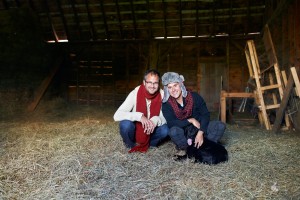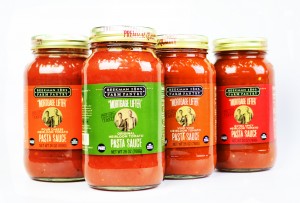Beekman 1802 Farm Pantry Goes On Beyond Local
By Lorrie Baumann
It was 2008, and Brent Ridge and Josh Kilmer-Purcell had a problem, and it was a big one. In 2007, they’d fallen in love with, and then bought, the historic Beekman Mansion and its surrounding farmland in tiny Sharon Springs, New York, about 180 miles north of New York City, intending to use it as a weekend getaway spot. They could afford it then – Ridge was Martha Stewart Omnimedia’s Vice President of Healthy Living, and Kilmer-Purcell was a well-paid advertising executive. And then the Great Recession came for them, and both of them lost their jobs.
 What they had at that point was a farm with a mortgage; not a whole lot of experience in actual farming, although both had grown up in rural America and knew more than many Americans about the intimate connection between food and dirt; their educations; creativity; and the drive to make their situation work. “We were kind of thrust into making the farm work,” Ridge said ruefully. Kilmer-Purcell wrote a book that details some of this, “The Bucolic Plague,” which became a best-seller on the strength of making it all sound very jolly.
What they had at that point was a farm with a mortgage; not a whole lot of experience in actual farming, although both had grown up in rural America and knew more than many Americans about the intimate connection between food and dirt; their educations; creativity; and the drive to make their situation work. “We were kind of thrust into making the farm work,” Ridge said ruefully. Kilmer-Purcell wrote a book that details some of this, “The Bucolic Plague,” which became a best-seller on the strength of making it all sound very jolly.
They got some goats and started making goat milk soap along with a more experienced farmer that they call Farmer John. They invested the profits from their goat soap business into qualifying as a Grade A dairy, so that they could eventually make and sell cheese. They grew produce and took it to the farmers market.
 Then in 2012, they took some of their Mortgage Lifter tomatoes, named because the varietal was so delicious that it became known as a sure-fire seller that could help a farmer pay off the mortgage, and turned them into Mortgage Lifter Heirloom Tomato Sauce, and Beekman 1802 Farm Pantry was born. Early on, they dedicated up to 25 percent of the profits from the sauce to help other small farms, through their Mortgage Lifter Program, which assists small family farms with a viable, future-focused, growth-oriented business strategy. The project has raised more than $40,000 so far for small farms.
Then in 2012, they took some of their Mortgage Lifter tomatoes, named because the varietal was so delicious that it became known as a sure-fire seller that could help a farmer pay off the mortgage, and turned them into Mortgage Lifter Heirloom Tomato Sauce, and Beekman 1802 Farm Pantry was born. Early on, they dedicated up to 25 percent of the profits from the sauce to help other small farms, through their Mortgage Lifter Program, which assists small family farms with a viable, future-focused, growth-oriented business strategy. The project has raised more than $40,000 so far for small farms.
Then Target picked up the sauce, and Ridge and Kilmer-Purcell took to their social media channels to ask people to buy it. It sold out within days. Around the same time, the partners entered and won Season 21 of “The Amazing Race,” which enabled them to pay off their mortgage.
Target asked for more product. Ridge, Kilmer-Purcell and Beekman 1802 Farm Pantry were on a roll.
They were, however, still living in tiny, rural Sharon Springs, New York, among neighbors who didn’t have a deal with Target and hadn’t won “The Amazing Race.” “We live in a very rural community, so we understood the struggles of small farms in our area,” Ridge said.
Part of what they understood is that their neighbors were growing produce that could be turned into the kinds of shelf-stable, high-quality products that interested Target, but they didn’t have the food processing capability to make those products, and that was leaving them out of the competition for most of the $640 billion dollars a year that Americans spend in the grocery store. “More farmers markets spring up every year, and they now represent about $1 billion in grocery revenue each year. Still, the majority of people are buying their groceries in the middle aisles in the grocery store,” Ridge said. “Going to the farmers markets is so hard that we knew that the needle wasn’t going to move much further unless farmers could get better representation in the middle store.”
The obstacle between farmers and the grocery store’s center aisles is the processing facility that turns seasonal produce into shelf-stable products that can be offered for sale year-round. “The path for getting a product to the shelf is really convoluted,” Ridge said. “Large manufacturers source ingredients from lots of different places. They source ingredients in vats, and then process and package. We were looking at how to insert the small farm into that process and claim a portion of that $640 billion.”
Some farmers have solved this problem by building processing facilities on their own farms, but that requires a capital investment that many are not able to make. Others have solved the problem by processing their products in rented kitchen spaces, including a growing number of publicly- and privately-financed incubator kitchen projects. But, of course, those aren’t available in every rural community. Beekman 1802 Farm Pantry went a third way.
Ridge and Kilmer-Purcell went looking for existing production facilities with available capacity. They had to be not too small, because Beekman 1802 Farm Pantry had to supply enough product to satisfy Target’s demand for national distribution. But they also had to be not too big, because Ridge and Kilmer-Purcell never lost sight of their idea that this was about a mission to help their neighbors, and they wanted to do business with manufacturers that would share that mission. “We feel like there’s a bigger mission to what we’re trying to accomplish, and accomplishing that mission requires the neighbors,” Ridge said. “We’re trying to help support as many craftspeople and entrepreneurs and local economies as possible and to figure out how to get the small farmer greater representation in the middle aisles of the grocery store.”
Ridge and Kilmer-Purcell undertook a nationwide search to find those manufacturers who’d agree to do small-batch processing for the products that Target wanted on its shelves with produce supplied by their local farmers. Casa Visco and Gatherer’s Granola, in Schenectady, New York, and Drew’s in Chester, Vermont, stepped up. So did Conifer, Inc. in Woodinville, Washington, and Dundee Fruit, in Dundee, Oregon. “It involves so much relationship management between everybody. The manufacturer has to agree to spend more time and maybe pay a little more. The farmer has to learn how to deal with the manufacturer. Target has to do the learning about how to make relationships with small manufacturers work,” Ridge said. “The result is a premium product that you’ve not seen before in mass retail. We’re really proud of this initial set of products…. When you taste the product, they really do taste like that product you bought at the farmer’s market. We’re using recipes for small batches and with fresher ingredients, and that’s the benefit of it.”
Target launched 48 Beekman 1802 Farm Pantry products in November exclusively at 250 Super Target stores and 650 Target Pfresh stores nationwide. The products rolled out to an additional 500 Target Pfresh stores in January. The range includes salsas, salad dressings, cooking sauces, condiments, baking mixes and seasoning blends. All products either contain ingredients sourced from small farms, are organic, GMO-free or a combination of the three. “We’re still a small goat dairy in upstate New York. That’s still our story and we’re just really passionate about helping other small farms tell that story as well, Ridge said. “They’re trying to save their own farms. We’re also invested in telling that story. That story is our story. So many companies try to tell an all-natural farming story.”

You must be logged in to post a comment.